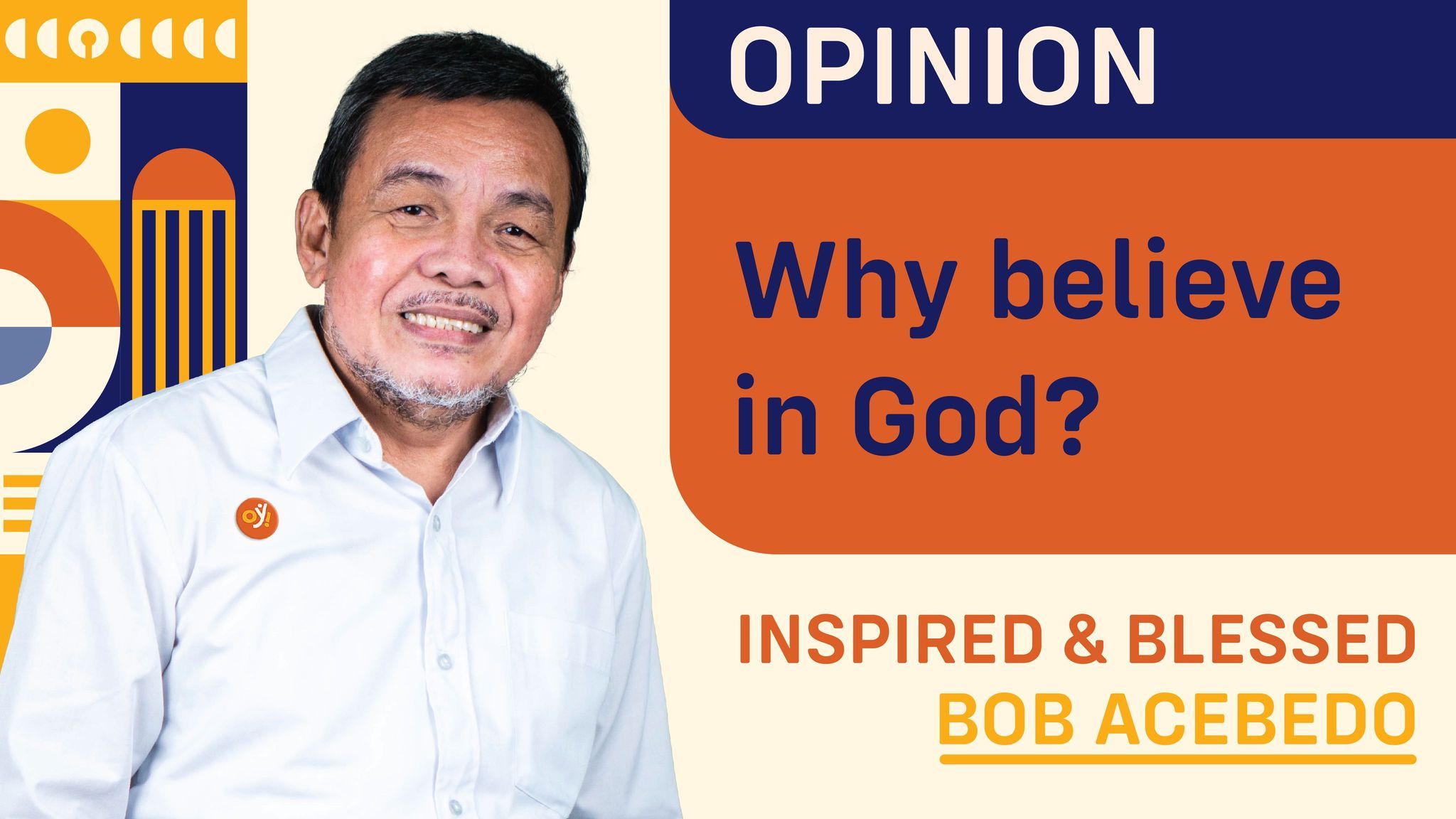This ever-penetrating query presupposes two germane points: one, the existence of God, and; two, the relevance or meaningfulness of believing in God.
For this piece, I’d like to tackle more on the second point: Why should or why does one want to believe in God? In other words, in the pragmatic scheme of things, does believing in God matter or not?
Theists would readily proffer their reasons for believing in God, agnostics for being skeptical or doubtful, and atheists for not believing at all. But what is more exigent to find out is what impact is their belief or unbelief on their particular real lives.
Back in my philosophy studies in the seminary, I have come across some witting reasons why people, in the realm of real-life experience, tend to believe in God. One, for instance, dubbed as “foxhole religion,” argues that people do believe in God only because of fear – in particular, about the uncertainty of what lies beyond death. Then, there’s the Freudian (Sigmund Freud) explanation that God is nothing but an “obsessional neurosis,” or simply a product of human instinctual desire or anthropomorphic thinking. Also, there was the Marxist critique of religion and “dialectical materialism” postulating that belief in God is only embraced by the hapless masses as an illusory escape from their deprivation, and at the same time advanced by the capitalists and ruling bourgeoisie (‘burgis’) to maintain their hegemonic control.
Now, in our contemporary milieu, I’d like to draw some pragmatic reasons for believing in God from two contemporary thinkers – one is a systematic theologian and the other is a physicist.
First is Sarah Coakley, professor of divinity at Cambridge. For Coakley, to be able to answer the question – why believe in God? – is first to examine one’s honest motive. “That’s a very old question asked to monks when they come to the monastery, ‘Quid petis?’ What do you seek? Because I think that is the core question that should be at the center when people say, why do you believe in God?”
Then Coakley continues to point out that answering such question in a personal way will not only huddle in rational arguments for God’s existence but will more importantly evoke personal relevance and meaningfulness. “Let’s say that God is reaching out to you in some way on your niggle that you would like to believe in him. And let’s say there are some arenas of your life which have a sort of element of vulnerability – of love, of desire, of pain – where God could get in. Under what conditions do you think that (vulnerability) might lead to something? And then I would ask you the big existential question, which is, where are true joys to be found? That encircles back to the question, what are you seeking?”
Finally, according to Coakley, the penetrating soul-searching would lead to what she calls an existential “rehearsing of death.” Coakley explains: “As a believer, I finally find that it is in the silent waiting on God, the ultimate transcendent reality, that impinges on me. It’s a kind of rehearsal for the moment when I finally have to give over control, which will be the moment when I die, because once we’re no longer afraid of death, then we’re no longer afraid of life. So, perhaps what’s a little bit different about the way I approach arguments for the existence of God is to think about the context of desire transformative practices and ultimate longing more than taunting up the relative value of arguments.”
Our second contemporary source is Christopher Ishan, first-class physicist at London’s Imperial College. For Ishan, who was baptized as Christian only on his 40th birthday, there is room in reality for planes of existence beyond the physical, for mystical experiences beyond the mundane, for belief in the existence of God – and the avenue for such is the personal experience of suffering. “I’ve been involved over the years with fool-proof science and religion interaction. But it always seemed to me that the wrong thing to be talking about was not actually science and religion, but the problem of evil and suffering, which is nothing to be science per se. I have a neurological disease that has landed me in the hospital for several times. And out of my personal encounter with suffering, I felt at the very heart of reality, at a profound level, that there is God, providing a sense of meaningfulness to my suffering.”
Apropos these foregoing reasons, here’s my take.
Of course, I cannot disregard the different theistic positions or arguments I’ve learned in philosophy: the ontological argument of St. Anselm, “God is the being none other than which can be conceived” and that the very idea of God implies his existence; St. Thomas Aquinas’ causal argument that God is the “uncaused cause” and “unmoved mover”; the teleological argument of God’s existence as inferred from this world’s design, value, and purpose.
But, more profoundly, in the practical realm of things, my stance is simple. Amid the imperfections of life and regardless of the uncertainty about the afterlife – isn’t it more practicable, convenient and comforting to believe (than not) in a “transcendent yet immanent” God and thus find MEANING in all of life’s joys and sorrows, happiness and pains (including natural and moral evils)?
After all, for me, what is more important in life is not proving or disproving the existence of God but experiencing or living a meaningful, happy and satisfying life – as can be derived from “believing” in God.
#InspiredAndBlessed #BobAcebedo #WhyBelieveInGod #ExistenceOfGod #Agnostic #Theology #Philosophy #Freudian #Marxist #SarahCoakley #ChristopherIshan #OpinYonColumn #OpinYon #WeTakeAStand
